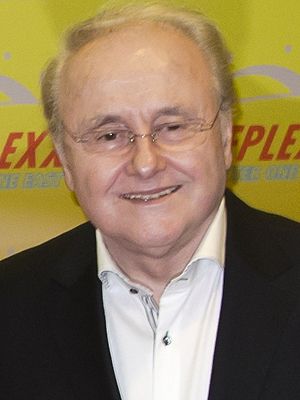Krsto Papić facts for kids
Quick facts for kids
Krsto Papić
|
|
|---|---|

Papić in March 2012
|
|
| Born | 7 December 1933 Vučji Do, Yugoslavia
|
| Died | 7 February 2013 (aged 79) Zagreb, Croatia
|
| Nationality | Croatian |
| Occupation |
|
| Years active | 1965–2012 |
| Spouse(s) |
Jadranka Štefanac
(m. 1990) |
| Children | 2 |
| Awards | Berlin Golden Bear for Best Film Nominated 1974 A Village Performance of Hamlet Golden Arena for Best Director 1970 Handcuffs 1992 Story from Croatia 1998 When the Dead Start Singing Fantasporto Award 1982 The Redeemer |
Krsto Papić (born December 7, 1933 – died February 7, 2013) was a famous Croatian screenwriter and film director. He worked in movies for over 50 years. Many people think he was one of the best directors from the former country of Yugoslavia. He was also part of a special film movement called the Yugoslav Black Wave.
Contents
Krsto Papić's Life Story
Papić was born in a place called Vučji Do, near Nikšić. This area is in modern-day Montenegro. His first movies and documentaries were part of a new style of filmmaking in Croatia and Yugoslavia. These films were often seen as a Croatian version of the "Black Wave" art movement. This movement mostly happened in Serbia.
Early Career and Challenges
Krsto Papić was also connected to a political movement in the early 1970s called the Croatian Spring. He was part of a group of film lovers in Zagreb. This group was inspired by the French New Wave of movies and by director Alfred Hitchcock. Other filmmakers and critics like Zoran Tadić were also in this group.
Papić's two most famous early films were Lisice (Handcuffs) and Predstava Hamleta u Mrduši Donjoj (A Performance of Hamlet in the Village of Mrdusa Donja). These movies often faced criticism from the government. For example, Lisice was not allowed to represent Yugoslavia at the Cannes Film Festival.
Another film, Izbavitelj (The Redeemer), also received strong criticism. Some people thought its story about fascism was also a hidden message about communism.
Later Films and Recognition
Papić's later films had a more traditional storytelling style. However, they still caused political discussions in the last years of Yugoslavia. His film My Uncle's Legacy is a good example. It looked at the political situation in Yugoslavia during the time of Titoism.
This movie was nominated for a Golden Globe Award for Best Foreign Language Film in 1989. But its production was delayed for a few years because of political opposition. Many intellectuals and newspapers supported the film, and it was eventually made.
Krsto Papić received important awards for his work. In 2006, he won Croatia's highest Vladimir Nazor Award for his lifetime achievements in cinema. In 2004, he received the Grand Prix Special des Amériques for his amazing contribution to film art.
He passed away in Zagreb on February 7, 2013, at the age of 79. He had been battling stomach cancer.
Krsto Papić's Movies
Here is a list of some of the films Krsto Papić directed:
- 1965 – The Key (Ključ) – This was a film made of several short parts. Papić directed the part called Waiting (Čekati).
- 1967 – Illusion (Iluzija)
- 1969 – Handcuffs (Lisice)
- 1973 – A Performance of Hamlet in the Village of Mrdusa Donja (Predstava Hamleta u selu Mrduša Donja) – This film was shown at the Berlin Film Festival.
- 1976 – The Rat Savior (Izbavitelj) – Also known as "The Redeemer." It won awards at the Trieste International Science Fiction Film Festival and Fantasporto.
- 1980 – The Secret of Nikola Tesla (Tajna Nikole Tesle) – This movie was made in English.
- 1988 – My Uncle's Legacy (Život sa stricem) – Nominated for a Golden Globe Award.
- 1991 – Story from Croatia (Priča iz Hrvatske) – Also known as Idaho Potato.
- 1999 – When the Dead Start Singing (Kad mrtvi zapjevaju)
- 2003 – Infection (Infekcija) – This was a new version of his earlier film The Redeemer.
- 2012– Flower Square (Cvjetni trg)
See also
 In Spanish: Krsto Papić para niños
In Spanish: Krsto Papić para niños

